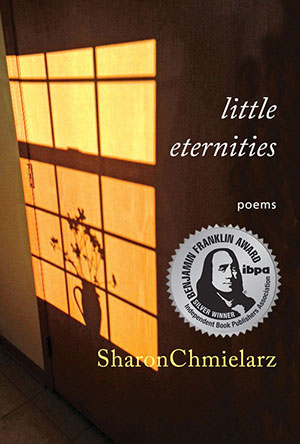
little eternities
Nodin Press, 2017
In this expansive collection, the narrator describes events she may or may not have witnessed and muses on history and the ways images present themselves, some as homey as fiddling with an alarm clock, others as arcane as an Egyptian heiroglyph. The question “What time is it, anyway?” a line from an early poem, courses through the work, but the reader soon stops asking, drawn in by impressions loosened from personal crisis, images as common as rain falling on the roof or as startling as: “Money can be / a gleaming avenue, a night / of snow, a fine dizzying swirl, a cold / white wine’s kind of spin under / the street lamp…”
Humor abounds in poems such as “Size,” which describes the world inhabited by a woman who wears a size 0 dress, and a series of reflections about a Halloween pumpkin containing the line Humans want their gods to look like them / and lead them through the dark. Several of the poems explore the character of individual words that have survived from the early history of the English language–bumble, sleek, bilge. Once again past and present meet, converse, get to know each other.
But such generalities can take us only so far in apprising a collection as rich in intelligence and whimsy as this one. It elicits comparisons to both the brilliant wordplay of Marianne Moore and the subtle metaphysics of Wislawa Szymborska. Little eternities indeed. That’s a contradiction in terms, though it beautifully conveys how truthful, simple, and penetrating Chmielarz’s poems can be.
Listen and read: “little eternities“
Honors and Recognition
Independent Book Publishers Association
Ben Franklin Prize Silver Winner
Reviews
Lapidary, effortless, crystalline, and cocky, little eternities is a time machine. Step inside and find yourself on a journey with surprising turns and feints, words translating into wormholes, crossing centuries, tunneling through etymology, through music and art. (Marsha de la O, Antidote for Night)
I turned to the first page of little eternities and I was off and running, charmed and breathless, with a wide-ranging, deep-thinking poet who captures the elusive and overwhelming nature of time. Individual lines become brilliant little eternities, flowing images and memories that take us into history and science or the wonders of art and literature. (Freya Manfred, author of Speak, Mother and other poems)
little eternities is a book that burnishes the oldest questions into shiny new artifacts of wonder. Expansive curiosity and microscopic observations are both at work (and play) here, inviting us again and again to curlicue along “where birds/fly by, where movement/comes to go away, not knowing/gone is a word for everything seen.” (Ed Bok Lee, Whorled)
From modest positions–flesh, bone, spirit, and memory—Sharon Chmielarz’s poems proceed into and beneath the present, the past. They time-travel with a need to know. Be they about swatting flies at a summer cabin or insinuating oneself into a painting by Van Gogh, the poems say “This is how eternity works so far.” (Richard Robbins, author of Body Turn to Rain: New and Selected Poems)
Sharon Chmielarz’s brilliant poems quietly push open gates that confine much of American poetry. They homestead outside the comfortable, predictable, and often constricting time/space continuum. (Philip S. Bryant, Stompin’ at the Grand Terrace, a jazz memoir in verse)

